You want to do what’s right for the planet, which involves making smart purchasing decisions. But in a world flooded with single-use plastic, it’s hard to know where to put your money.
Table of Contents
The United States produces over 35 million tons of plastic every year, and just 8.5% of it ends up recycled. The rest winds up in landfills where it takes thousands of years to break down, leaching toxic chemicals into the soil in the process. This is a growing problem, as plastic trash now makes up close to 20% of all municipal waste, up from under 1% in 1960.
Today, many companies are alarmed by this trend and are innovating new ways to transform what would otherwise be waste material into valuable products.

Recycled plastic comforter
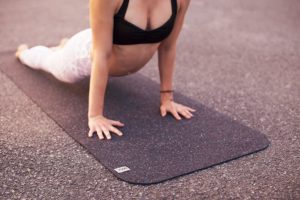
Yoga mats made from recycled wetsuits

Toys made with 100% recycled materials
Below, we’ve compiled a list of ten brands that are upsetting the status quo by selling quality products made from recycled plastic. Consider buying from them to support cleaner consumerism and the transition away from a throwaway society. Curious about how we rate products? Click here to view our methodology, which at its core, is about voting with our dollars to fight climate change.

Buffy Cloud Comforter
Highlights: The Buffy Cloud consists of a super-soft eucalyptus fabric outer shell that’s filled with BPA-free recycled PET fibers that come from plastic bottles.
Price: $129
Enjoy a guilt-free sleeping experience with this comforter composed of 100% recycled plastic. The Buffy Cloud consists of a super-soft eucalyptus fabric outer shell that’s filled with BPA-free recycled PET fibers that come from plastic bottles. In other words, each comforter prevents approximately 50 plastic bottles from landing in the trash.
See also: The Best Organic Cotton Comforters
The outer eucalyptus shell does its part for the planet as well, as this earth-friendly fiber is grown using one-tenth the water of cotton and requires no toxic pesticides. Better yet, Buffy’s mill partner is committed to planting four new trees for every three harvested.
As a company, Buffy is committed to offsetting all CO2 emissions generated from freight and customer shipments. The brand also encourages customers to donate unwanted comforters rather than shipping them back to minimize waste and fossil fuel use during shipment. It’s also working towards a ten-year goal for a 100% closed-loop production system that would generate zero waste from product conception to disposal.

Suga Yoga Mats
Highlights: Each USA-made yoga mat is 100% crafted from recycled wetsuits, and the company has designed the mats to specific tolerances for density, tackiness, durability, and more to ensure they perform better than other yoga mats on the market.
Price: Yoga mats range from $65-$99
Take your yoga practice to the next level with a sustainable mat from Suga. Each USA-made yoga mat is 100% crafted from recycled wetsuits.
This neoprene material is challenging to dispose of responsibly, as it is bulky and requires thousands of years to break down. Transforming wetsuits into yoga mats gives this material a new life and leaves you with an ultra-rugged workout space that can withstand any yoga practice.
See also: The Best Nontoxic Yoga Mats
In fact, the company has designed the mats to specific tolerances for density, tackiness, durability, and more to ensure they perform better than other yoga mats on the market.
Suga is a member of 1% for the Planet in support of responsible environmental practices. As an added benefit, the company supports programs for you to return your mat to them at the end of its lifespan for responsible recycling. You can also donate your used wetsuit for 10% off a Suga mat purchase.

Green Toys
Highlights: Each product sold by Green Toys is manufactured in the US and made from 100% recycled materials.
Price: $11.99-$39.99
Parents know all too well how quickly children’s toys can build up in the home, most of which are constructed with cheap plastic destined for the dump within a few play sessions. Change this narrative of waste by investing in eco-friendly options from Green Toys instead.
See also: The Best Nontoxic, Climate Friendly Toys
Each product sold by this California company is manufactured in the US and made from 100% recycled materials, including recycled milk jugs and yogurt containers. Green Toys states that every plaything it sells surpasses both US and International standards for safe BPA and phthalate levels.
The packaging was the recipient of the 2009 Greener Packaging award, as the boxes are made from recyclable cardboard and are printed with renewable soy ink designed to biodegrade quickly.
The toys are also designed around the idea of imaginative play by improving off classic designs that don’t let high-tech bells and whistles get in the way of child creativity.
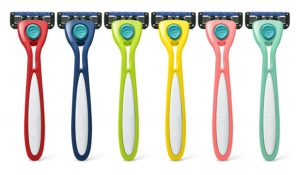
Preserve Personal Hygiene Products
Highlights: Preserve uses recycled yogurt cups for its brush handles and razors, ensuring each product consists of 100% recycled #5 plastics.
Price: $3.49 per brush, $12.99 per razor ($14.99 for four replacement blades)
Make a stand for sustainability with your personal care products by purchasing them from Preserve. This eco-friendly company utilizes recycled yogurt cups for its brush handles and razors, ensuring each product consists of 100% recycled #5 plastics. Depending on what materials were available for each brush, you can expect some color variation between products.
Note: the brush’s bristles are made from brand-new nylon for hygienic reasons.
The company has joined forces with the Preserve Ocean Plastic Initiative (POPi) to craft products from plastic collected along the coastlines. This reduces pollution and gives these otherwise single-use plastics a second life.
Preserve also claims to use a Life Cycle Assessment approach with every product to assess its total environmental impact from start to finish to continue improving its overall sustainability.
As things stand now, all Preserve plastic products can be recycled through both a mail-in and retail-based return program for #5 plastics. Likewise, you’ll receive your order with minimalist packaging that utilizes recycled materials whenever possible.
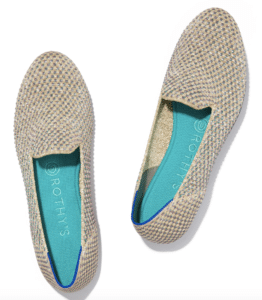
Rothy’s Shoes and Handbags
Highlights: Rothy’s works to offset its carbon emissions by partnering with The Envira Amazonia Project, which focuses on tropical forest conservation. In 2019, the brand offset almost 10,000 metric tons of CO2.
Price: Shoes range from $125-$245, bags range from $95-$450
Known for their ultra-comfortable shoes, Rothy’s is a noteworthy player in the world of sustainable fashion. Each pair is crafted from the brand’s trademark thread, which is made from plastic water bottles. This creates a shoe rugged enough to withstand daily wear—as well as trips in the washing machine.
Each pair of recycled plastic shoes is constructed through 3D knitting, which Rothy’s claims ensures an ultra-comfortable seamless fit and less waste on the factory floor.
You can choose from two different sustainable shoe soles: eco-friendly rubber or luxe vegan leather. It’s also possible to feel good about how your shoes are shipped to you as well, as they require minimal packaging, and the included cardboard inserts are bio-degradable.
The brand’s handbags also make a stand for sustainability, as they are built with plastic collected from within 30 miles of marine coastlines.
As a company, Rothy’s works to offset its carbon emissions by partnering with The Envira Amazonia Project, which focuses on tropical forest conservation. In 2019, the brand offset almost 10,000 metric tons of CO2.
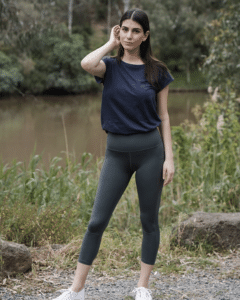
Team Timbuktu Activewear
Highlights: This Australian-based brand is changing the narrative around synthetic fibers used in sports clothes by crafting fabrics from recycled plastic bottles.
Price: Clothing ranges from $79-$219 AUD
Exercise in sustainable activewear this year by supporting Team Timbuktu. This Australian-based brand is changing the narrative around synthetic fibers used in sports clothes by crafting fabrics from recycled plastic bottles.
See also: The Best Organic Chill Wear for Women
The brand’s activewear collection averages 73% recycled plastic (and 27% elastane), and the tech-fabric jacket is currently 48% recycled plastic, with goals to make it 100% soon.
Learn more about its environmental record through the Team Timbuktu sustainability report.
Beyond its sustainable fabric choices, Team Timbuktu also works to ensure its suppliers comply with fair labor laws. The company checks in its manufacturers in India, China, and Taiwan on Skype every few weeks and completes at least one in-person visit per year.
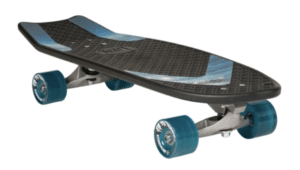
Bureo Skateboards, Sunglasses, and Apparel
Highlights: Products are made from recycled fishing nets and the skateboards are designed to last a lifetime while ensuring less plastic lands in the ocean in the long run.
Price: skateboards ($149-$199), sunglasses ($199+), shirts ($30+)
Enjoy your hobby knowing it’s supporting a healthier environment by investing in sustainable gear—like a skateboard made from fishing nets. These California-made boards are designed to last a lifetime while ensuring less plastic lands in the ocean in the long run.
The Ahi performance cruiser skateboard from Bureo is crafted from the brand’s certified NetPlus® material. This means each deck contains recycled plastic from approximately 50 square feet of fishing nets, while the Roundhouse ECOthane wheels are composed of a formula made from sustainable sources of soybean oil.
You can purchase other products from Bureo made with this recycled fishing net material, including sunglasses and apparel.

Everywhere T-Shirts
Highlights: These shirts are made from a combination of Global Recycling Standard (GRS) certified recycled yarn and 100% recycled PET polyester from plastic bottles.
Price: starts at $24
Claiming to produce the planet’s most sustainable apparel, Everywhere T-shirts contain little that isn’t getting a second life in the shirt. Each garment is made in the United States (either Los Angeles, CA or Detroit, MI) from 100% recyclable materials. Every shirt saves an average of 650-1200 gallons of water and produces up to six times less carbon emissions than organic cotton.
The shirts are made from a combination of Global Recycling Standard (GRS) certified recycled yarn and 100% recycled PET polyester from plastic bottles. Even the packaging contains 100% recycled paper, biodegradable soy ink, and soy-printed water-activated tape for additional sustainability.
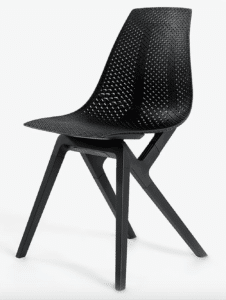
Noho Move Chair
Highlights: Almost every component of this chair comes from recycled plastics. Its eco-friendly design consists of ECONYL regenerated nylon, which is produced entirely from reclaimed fishing nets and old carpets.
Price: $375
Make your home décor do double duty for the planet by investing in sustainable pieces like the Noho Move chair. Almost every component of this chair comes from recycled plastics. Its eco-friendly design consists of ECONYL regenerated nylon, which is produced entirely from reclaimed fishing nets and old carpets.
At publication, Noho has pending B Corp accreditation for meeting rigorous social and environmental standards. The company also claims to ship each product using “knock down” packaging to minimize space needs and improve fuel efficiency.
Beyond sustainable construction, Noho Move chairs win points from a design standpoint with a patented four-way flex system that supports and cradles your back in a variety of reclining positions. You can also customize each chair with swappable covers made from New Zealand wool.
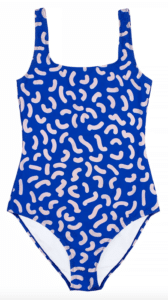
Batoko Swimwear
Highlights: These bathing suits are crafted from polyethylene terephthalate (PET) plastic waste that is sourced from plastic bottles, food containers, and many textiles.
Price: $66.52
Swimsuits and environmental sustainability rarely go together, but UK-based Batoko is changing that assumption. This independent swimwear brand has a line of bathing suits crafted from polyethylene terephthalate (PET) plastic waste that is sourced from plastic bottles, food containers, and many textiles. This otherwise single-use plastic is sorted, shredded, and spun into a polyester yarn used to weave each suit.
The end result? A quality bathing suit that only differs from standard brands in that you are keeping more plastic out of landfills. On average, each Batoko bathing suit represents ten plastic bottles. Shipping processes are also lighter on the environment, as each suit arrives in nothing more than a paper or recycled plastic mailbag.
Beyond its swimwear construction, the Batoko brand is taking steps towards environmental sustainability. The company donates a portion of its annual profits to grassroots organizations that focus on improving the world’s oceans and Europe’s native forest systems. Likewise, its workplace is powered by wind and solar energy, and the primary fabric suppliers are working towards a goal of zero-waste production.